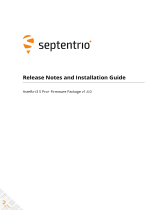
1 Installation Guidelines
In order to upgrade the firmware to version 1.4.0, only the following file is to be installed on the
receiver:
SUF file Located in Contains
AsteRx-i3 D Pro+-1.4.0.suf firmware/ See section 6
There is no need to install the file AsteRx-i3 D Pro+-1.4.0-failsafe.suf, unless Septentrio Support
advises otherwise.
2 New Features and Improvements
2.1 New features in version 1.4.0
1. The command setNMEAPrecision was extended with a compatibility option for usage with
Pixhawk auto-pilot system.
2. A new widget was added in the WebUI to facilitate the configuration of the receiver’s
orientation with regards to the vehicle.
3. Support was added for usage of QZSS satellites in PVT solution.
4. Galileo OSNMA support has been added.
2.2 Improvements in version 1.4.0
1. Support for Ethernet PHYs without a specific phy_id (phy_id is equal to zero) was added.
2. The stability of the INS solution latency has been improved.
3. Static detection under significant vibration has been improved.
4. All INS-related parameters and widgets have been grouped together on a single page of
the WebUI.
5. It is now possible to configure the PPS pulses to be generated every 4 seconds.
6. The spoofing detector has been improved and identifies more types of spoofers.
7. When using "setUMSDOnConnect,on" and the USB cable is disconnected, the internal disk
is now automatically re-mounted and logging resumes.
8. Antenna in-rush current limitation has been increased.
9. A new command setIpKeepAlive has been added to allow the customer to enable and
configure TCP/IP keepalive functionality on the IP and IPS ports.
2.3 New features in version 1.3.3
2








